ya1 [yá] vb. lit. = to use (occurs only
in construction with other verbs, and
has as its object nouns or noun phrases
that semantically express a wide
range of relationships with the second
and main verb of the sentence) such
as, instrumental: Ọ ya erọ fian iyan ―
“He used a knife for cutting the
yam”. temporal: Ọ ya awa eha dolọ
ẹre yi ― “It took him three hours
to repair it.” manner: Ọ ya ogiogiẹ
miẹ ẹre ― “She laughingly took it
from him or she took it from him
by laughing”; reason: Ọ ya ezurọ
rhia ẹre rua ― “He spoilt it out of
stupidity.” etc.
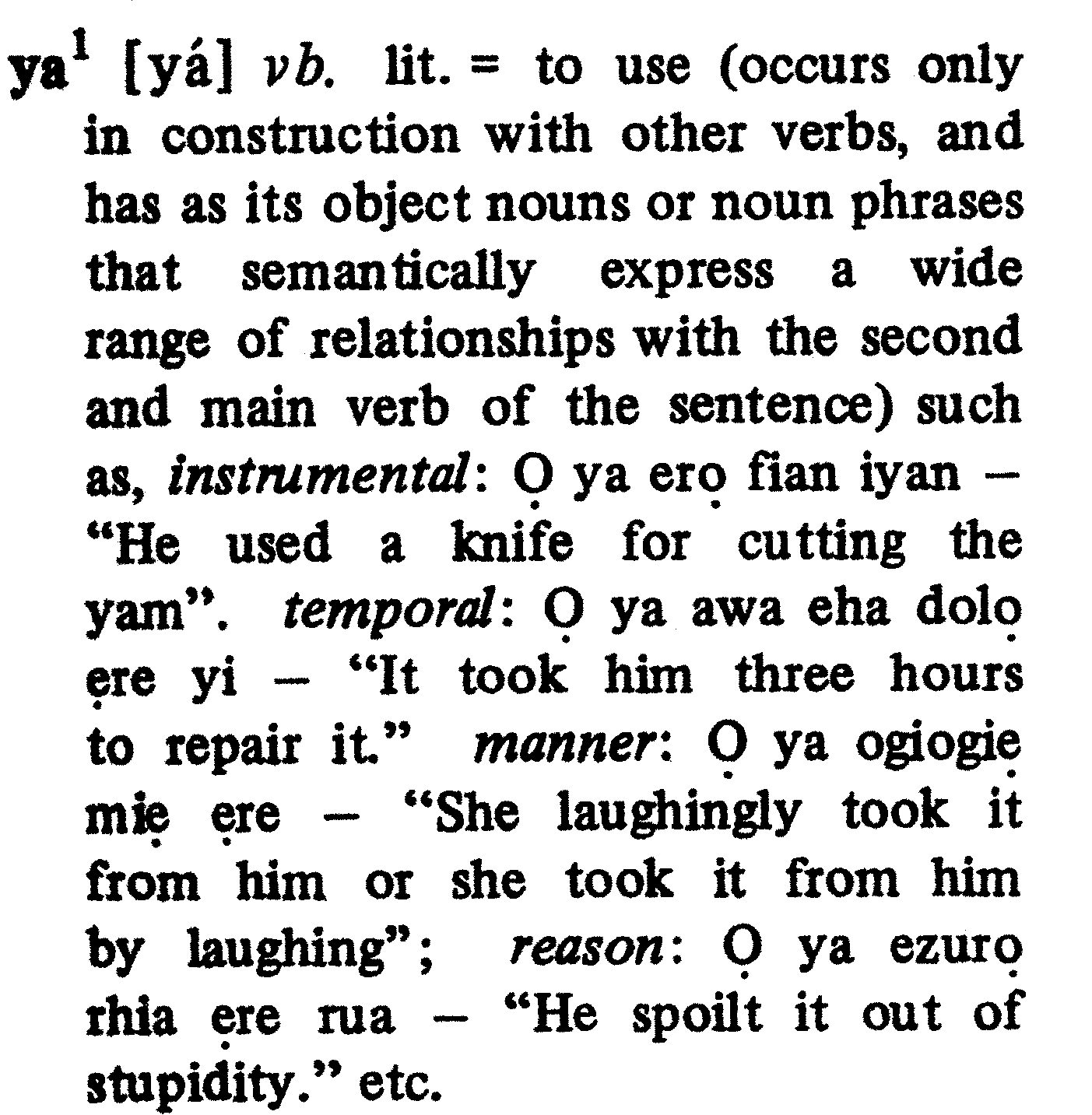
ya2 [yá] vb. (occurs only in construc-
tion with another vb.): to cause:
Ọ ya evbare khian aghaghan vbe ẹvbo
naa ― “He caused food to become
very expensive in this town.”

ya3 [yá] vb. to spend (time); to last
(for a certain length of time): Ọ
ya uki eha ọ ke rhia ― “It lasted
three months before it became
spoiled.”

ya4 [yá] vb. (usually followed by a
prep. na or ne): 1. to present with
a gift: Ọ ya ígho ne ibiẹka eso ―
“He presented some children with
%%

money.”; 2. (with ọmọ) to betroth:
Iran ya ọmọ nẹẹ ― “They betrothed
a girl to him.”

ya5 [yá] vb. (occurs only in construc-
tion with a second verb which serves
as the main verb of the sentence):
to proceed (to do something): Ọ
ya lovbiẹ ― “He went to lie down”;
Ọ ya gu ẹre winna ― “He went to
help him to work.”
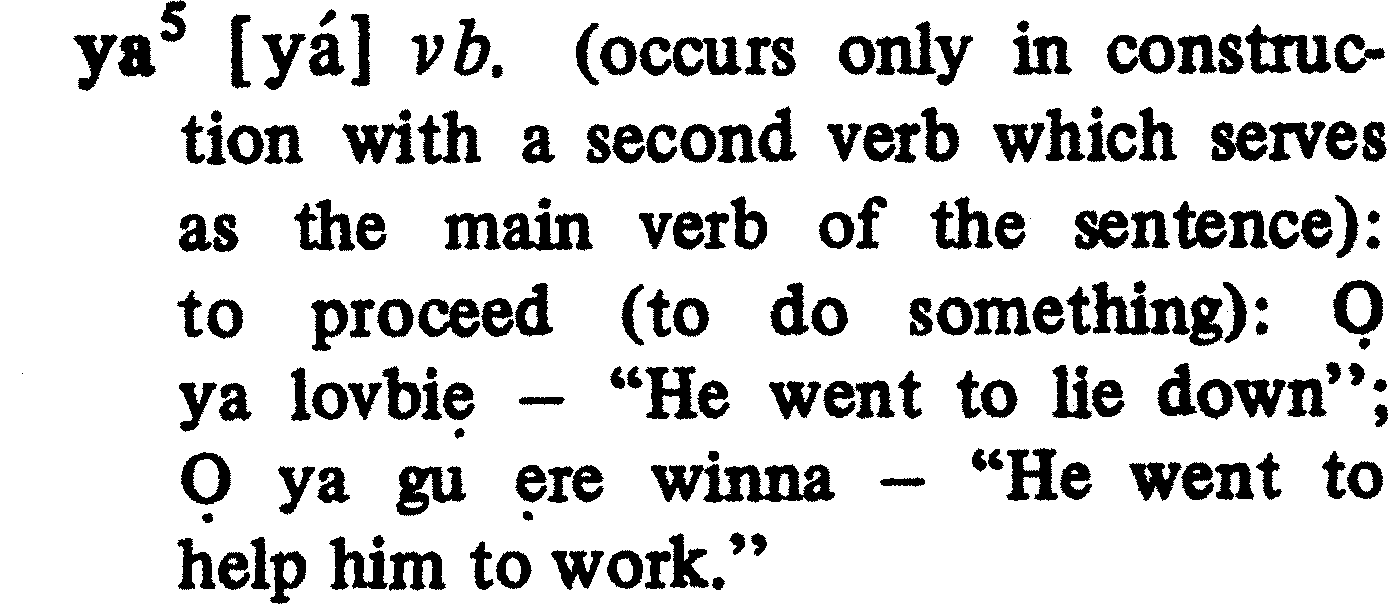
ya6 [yá] vb. (with ama) to make (a
mark) on: Ọ ya ama ye emwin ẹnrẹn
hia ― “He made a mark on all his
property.”

ya-baa [yàbàá] vb. 1. to join with;
to combine with: Iran yabaa enikẹre ―
“They joined with the rest.”^; 2. (in
Xtian sense) to bless: Osanobua
yabaa ọre ― 1. God blessed him;
2. God was with him.
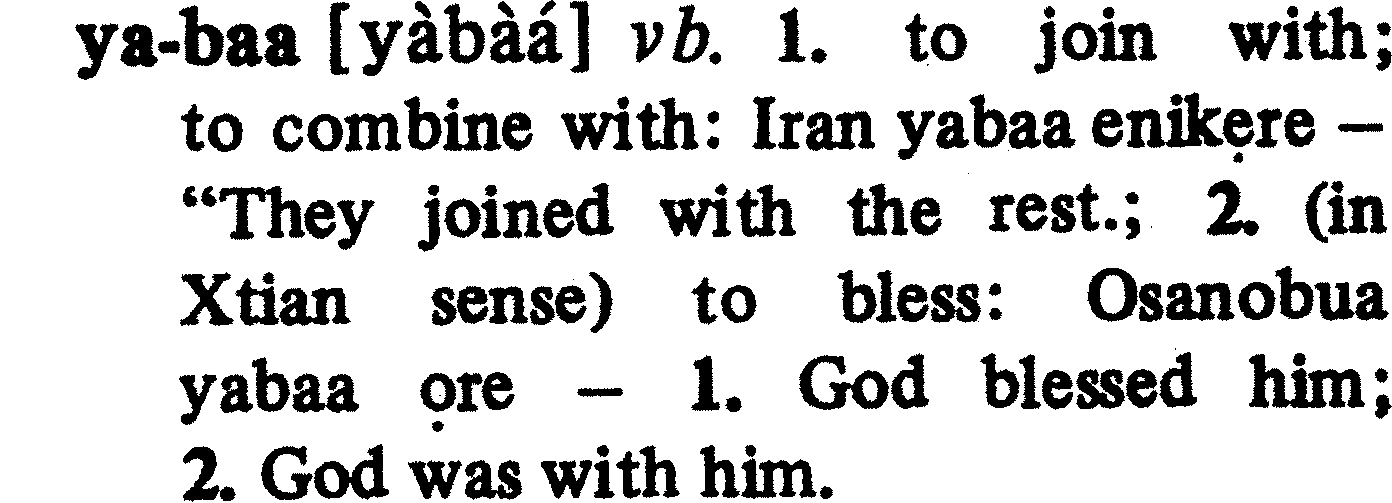
ya-gba [yàg͡bá] idiom.; vb. to become
stuck; develop a stalemate: Emwẹn
nii yagba ― “A stalemate has
developed over that matter.”

ya-ghae [yàɣàé] vb. to distribute; to
give away: Ọ ya ẹfe ẹre hia ghae ―
“He gave away all his wealth.”
$Page 164$

ya-leekhue [yàlèéxwè] idiom.; vb.
(also ya-neekhue) (< ya ― ne ―
ekhue) “to give to shyness”: to relent
(on account of somebody, or for
consideration of somebody). Ọ ya
emwin hia ne Ozo ru ẹre lekhue
erhae ― “He relented on all the things
Ozo had done to him on account
of his father.”
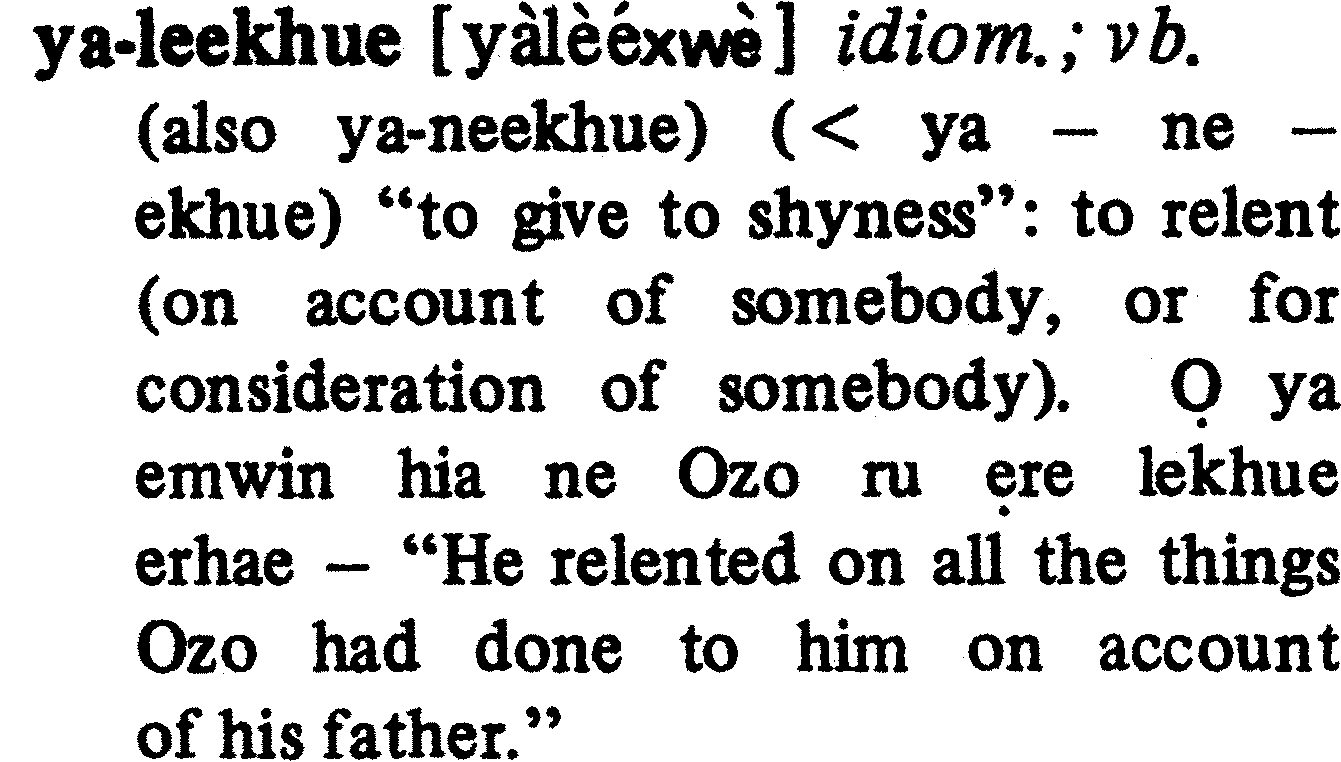
ya-maa [yàmàá] idiom.; vb. 1. to for-
give (someone): Ọ ya emwin hia ne
ọ ru maa rẹn ― “He forgave her all
the things she had done.”; 2. to expose
(esp. the faults of a person): Ọ ya egbe
ẹre maa vbe eke ne ọ yoo ― “He
exposed his bad ways where he went.”
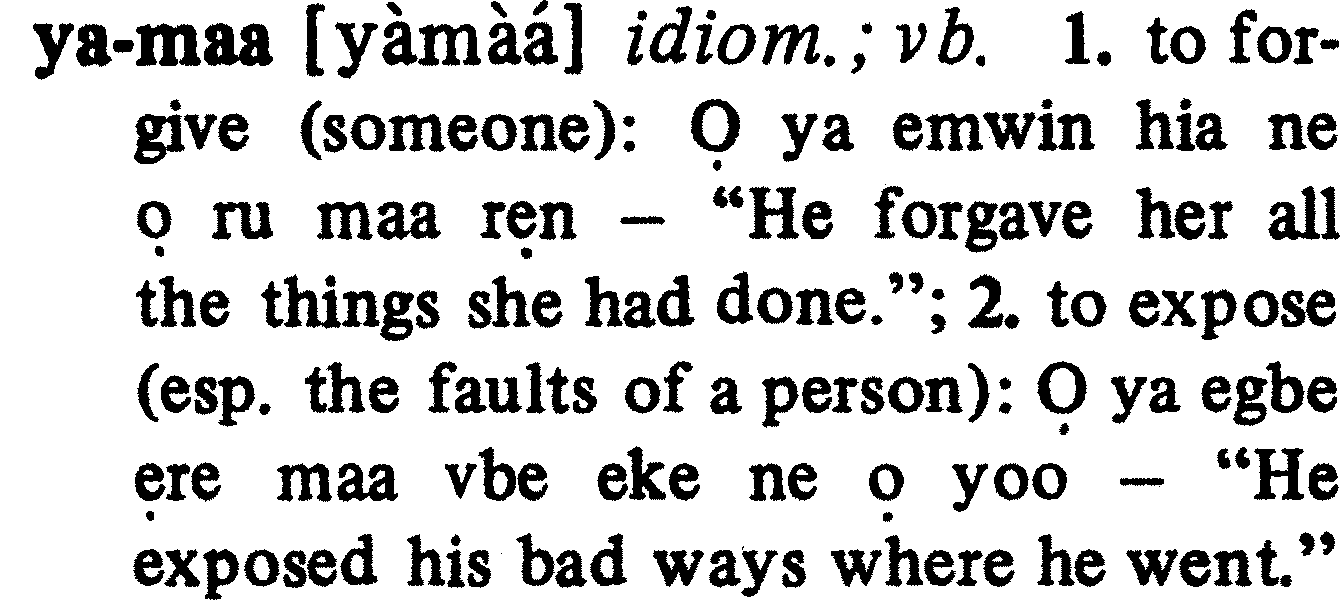
ya-wee [yàwèé] idiom.; vb. to be-
queath to; to authorize to own: Ọ
ya ẹfe ẹre hia wee iran ― “He be-
queathed all his wealth to them.”

ya-yi [yàyí] idiom.; vb. to believe; to
have faith in: Ọ ya ẹmwẹn ne u khama
rẹn yi ― “He believed what you told
him.”; 2. (in the religious sense) to
be a Christian: Ọ ma yayi ― “He is
not a Christian.”
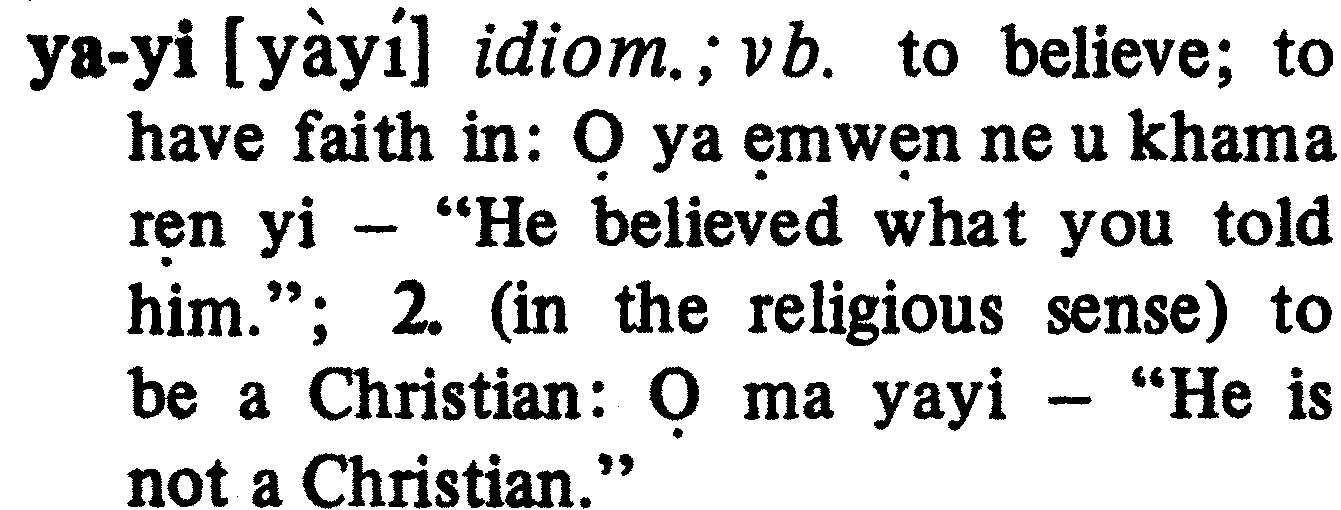
yaan1 [ỹã̀ã́] vb. to own; to possess:
Rẹn ọ yaaẹn owa ne ima ye ― “He
is the one who owns the house in
which we live.”

yaan2 [ỹã̀ã́] vb. to pledge; to promise:
Ọ yaanrẹn ighẹ ren gha sẹtin haa
osa nii ― “He pledged that he will
be able to pay up that debt.”

yalọ [yàlɔ́] vb. 1. (used of jelly-like
substance or other soft masses) to
scoop (a usually large bulk of): Ọ
yalọ obuẹ hin otọ rre ― “He scooped
off the clay from the ground.”; 2. (of
a large or amophous mass) to move
clumsily (e.g. of a very fat person):
Ọ yalọ khian ― “He is moving
clumsily along.” (Also: ọ yalegbe
%%
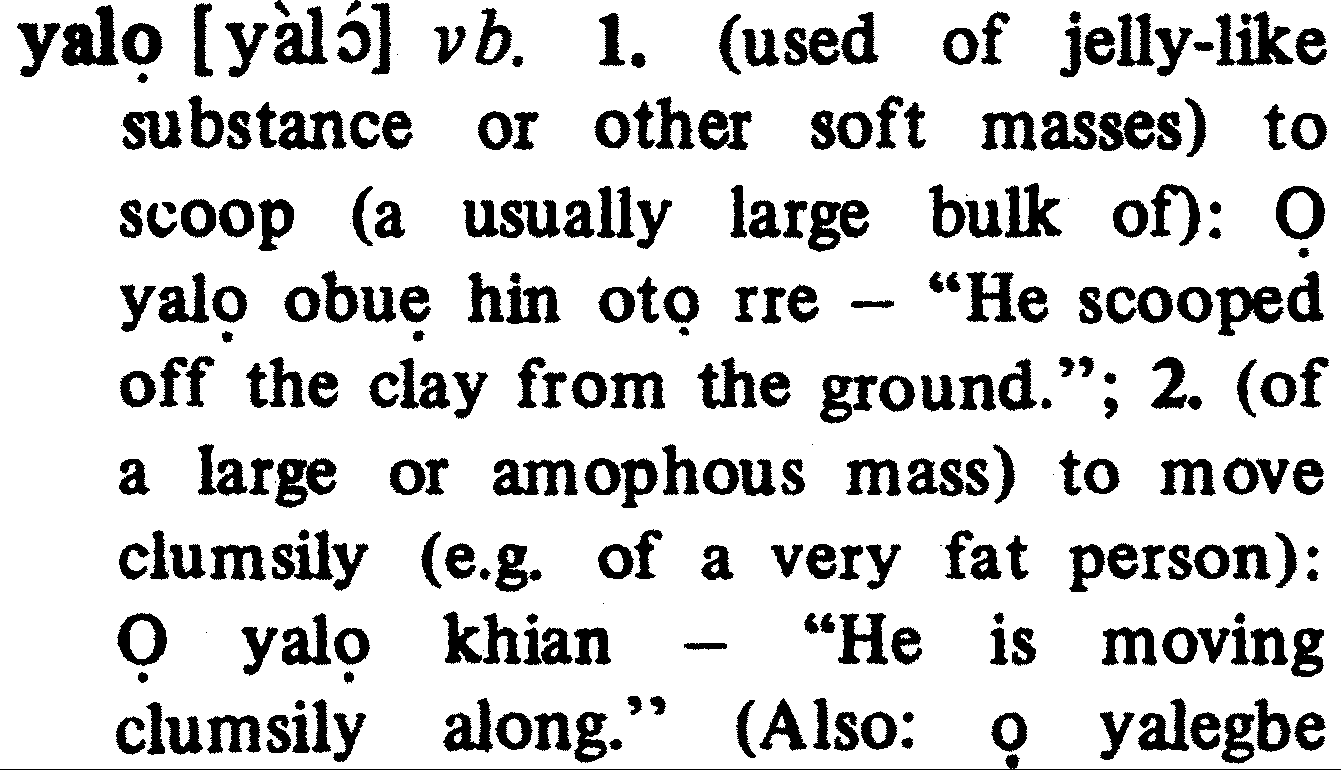
khian).

yan1 [ỹã́] vb. 1. to tear off; to sever;
to disjoin: Abọ ẹkpo na yan fua ―
“The strap of this bag has torn off”;
2. to ply open; to open wide: Ọ
yan ẹkhu yotọ ― “He opened the
door wide. (or He left the door
wide open).”
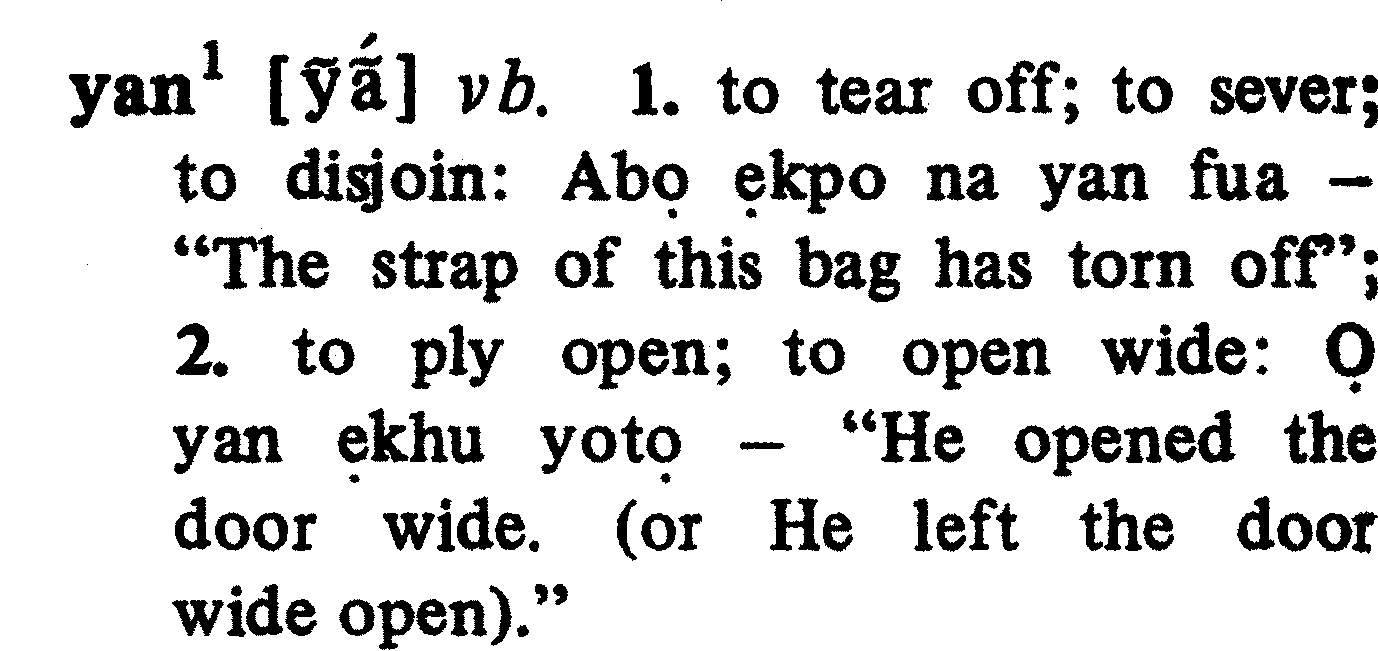
yan2 [ỹã́] vb. (of the limbs) to be
fatigued; to be weary after exertion;
to be exhausted: Owẹ yan mwẹn ―
“My legs are fatigued.”

yan3 [ỹã́] vb. (of fire) to be ablaze:
Erhẹn nẹ ọ hiere yan kua ― “The
fire he made is in full blaze.”

yan4 [ỹã́] vb. (e.g. of a child) to
make a lot of fuss; to demand a lot
of attention by crying frequently
and behaving hard-to-please: Ọvbokhan
na gha yan ma iyẹe ― “This child is
making a lot of fuss to his mother.”
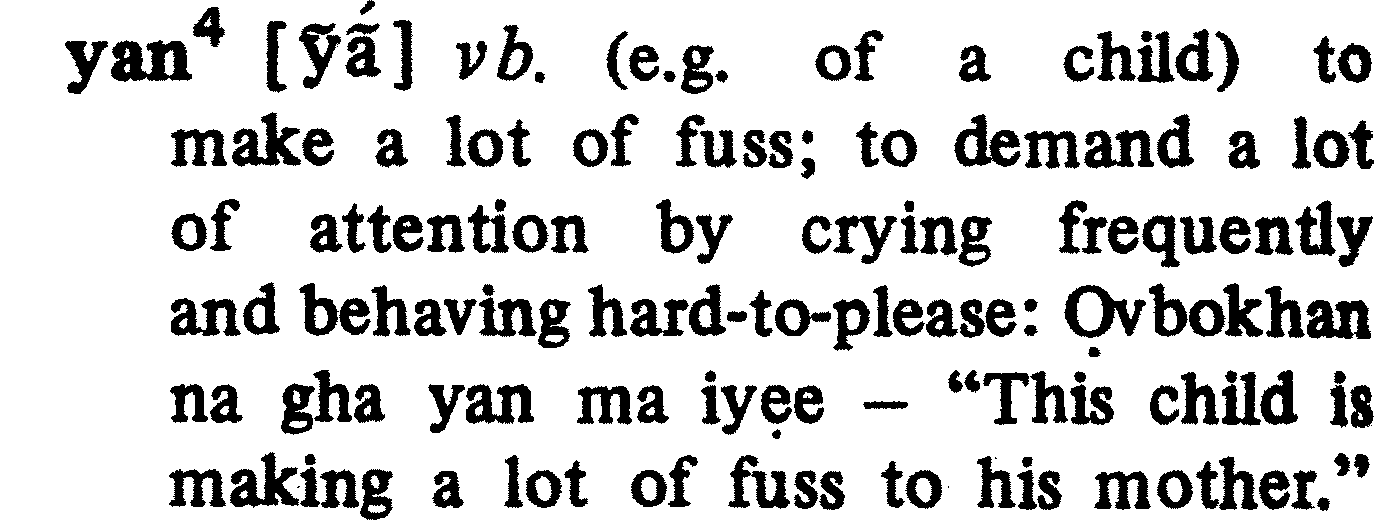
yangbe [ỹã̀gbé] vb. to ignore; to dis-
countenance: Ọ yangbe emwin dan
hia ne ọ ru ― “She ignored all the
bad things that he does.”

yanghan [ỹã̀ɣã́] vb. to tear to pieces;
to mangle; to tear roughly so as to
disfigure: Uwaya yanghan mwẹn
ukpọn rua ― “The wire has torn
my cloth to pieces.”
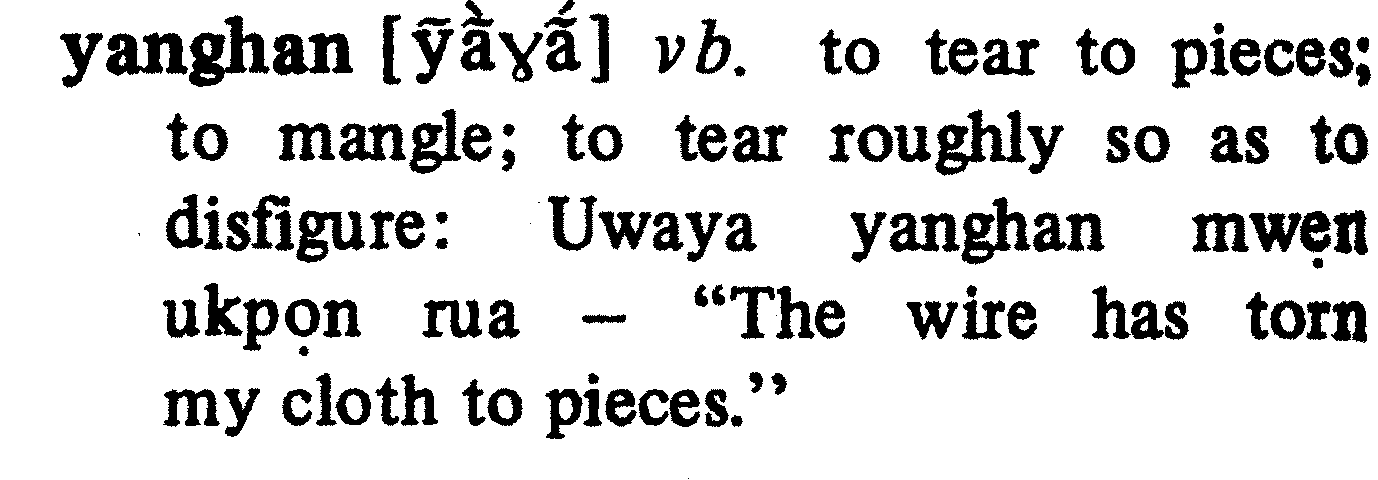
yanghananghan [ỹã̀ɣã̀ỹã̀ɣã̀] adj.; adv.
describes something that is disfigured
or ragged.

yankan [ỹã̀kã́] vb. to walk abnormally
(usually with legs spread apart): Ọ
yankan dee vbe egui ― “He is ap-
proaching with an abnomal walk
like that of a tortoise.”

yanrre [ỹã̀ré] vb. to be left over; to
remain: Emwin ne ọ khiẹn gbae, ọ
$Page 165$

yanrre ― “The things she is selling
are complete and with some left
over.”

yanyan [ỹã̀ỹã́] vb. 1. to yawn; 2. (of
lightning) to flash.

ye1 [yé] vb. to be like; to seem:
(Does not take clausal complements):
Ọ ye mosemose ― “It has the quality
of being beautiful: It is beautiful.”

ye2 [yé] vb. (as in yerhẹn) to make
or set (a fire): Akhuẹ ẹre iran khian
yerhẹn ye iku na ― “It is tomorrow
that they will set fire to this rubbish
heap.”

yè [yè] prep. expresses location: on,
at, in (depending on the noun that
occurs with it): yè owa ― “at home”;
yè aga ― “on the chair”; yè uvun ―
“in the hole”; etc. (when it occurs
at the end of a sentence, or after its
complement, its form is yi): Owa ẹre
o rhie ẹre yi. Vs. Ọ rhie yè owa; 2.
when it occurs before the object
pron: mwẹn or mwan, it becomes
yọ: Ọ tota yọ mwẹn owa ― “He
resides at my house.”
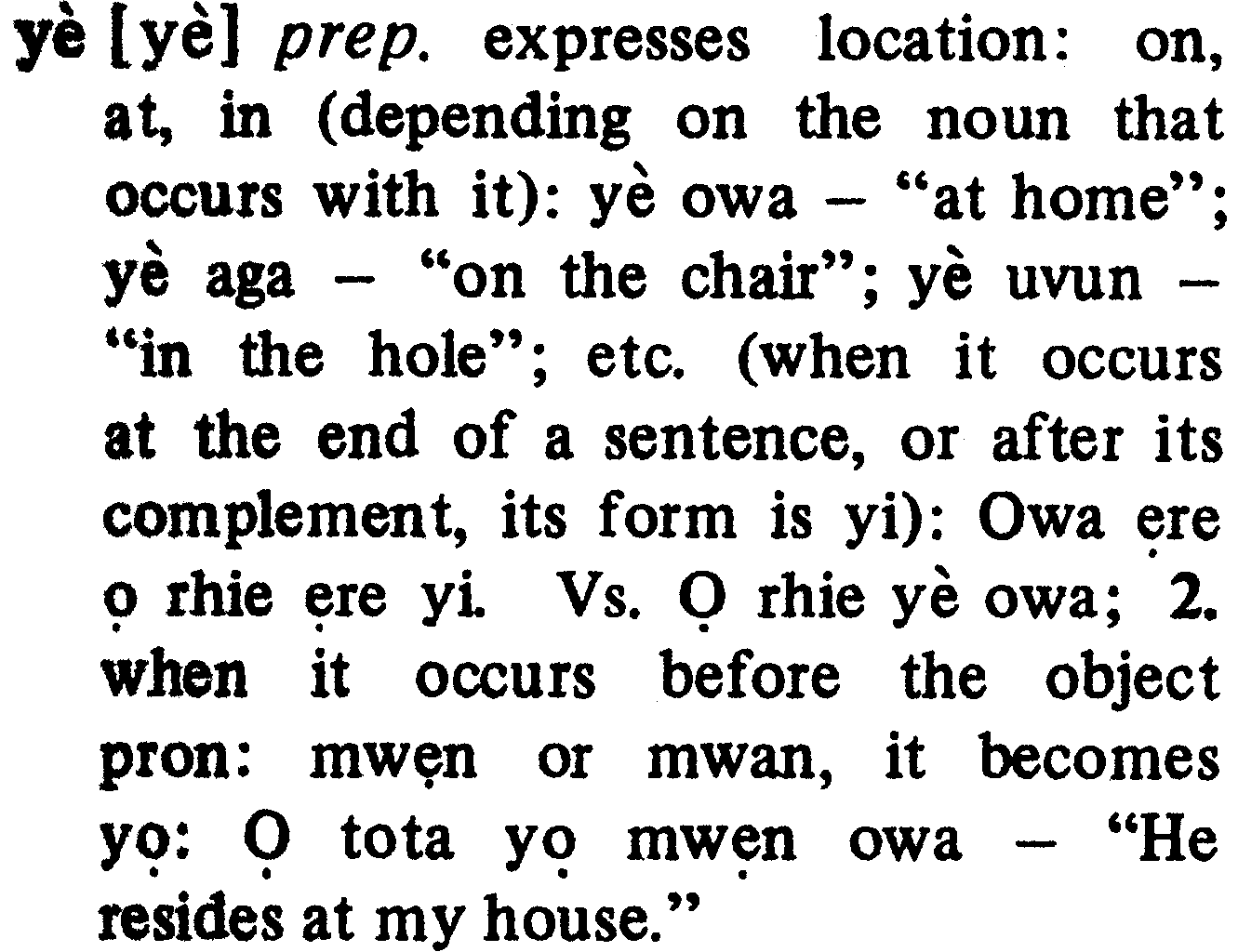
yee1 [yèé] vb. to recall; to remember:
Ọ yee ẹmwẹn ne i khama ọnrẹn ―
“He recalled the words that I told
him.”

yee2 [yèé] adv. expresses the adverbial
meaning of “still”: Ọ yee mose ―
“She is still beautiful.”

yee-rre [yèré] vb. 1. same as yee1;
2. to remind: Ọ yee mwẹn ẹmwẹn
ọnrẹn rre ― “He reminded me of
her.”

yegbe [yègbé] vb. to be cautious; to
be mindful of self: U ghu yegbe vbe
ehe ne u rrie na ― “You should be
cautious where you are going.”
%%

yenhọ [ỹẽ̀hɔ́] vb. (< yin ― ehọ) 1.
to be deaf; to be hard of hearing; 2.
to be stubborn; to be disobedient.
(cf. yin).

yẹẹ [yɛ̀ɛ́] vb. to please; to appeal to;
to delight: Ẹmwẹn ọnrẹn yẹẹ mwẹn ―
“Her matter appeals to me”: “^I
like her.”

yevbe [yéʋe] vb. to be like; to seem:
Ọ yẹvbe ne ọ vbiẹ ― “He seems to be
sleeping.” (cf. ye).

yẹẹn [ỹɛ̃̀ɛ̃́] vb. to press upon (usually
with something heavy): Ọ ya olọ yẹn
ọnrẹn ― “He pressed it by means of
a grinding-stone.” yẹẹn muotọ ―
“to press down.”

yẹẹn-egbe [ỹɛ̃̀ɛ̃̀gbé] vb. to exert the
physiological pressure necessary to
eject something from the body through
any of the posterior openings, e.g.
in childbirth; or during defecation.
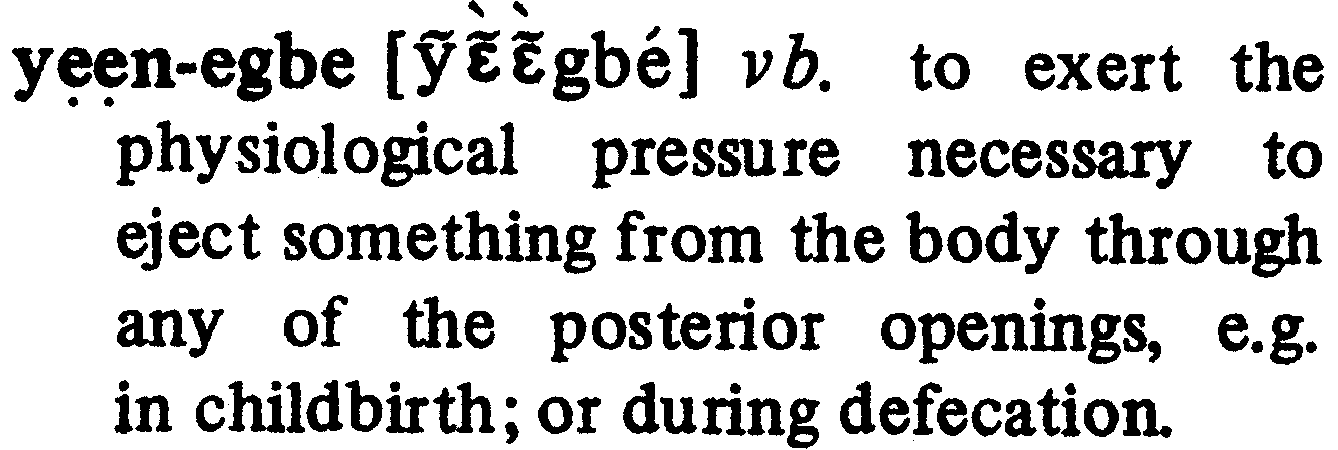
yẹnkẹn [ỹɛ̃̀kɛ̃́] vb. same as yankan.

yẹnkẹn [ỹɛ̃̀kɛ̃̀] adj. very big (e.g. a
large-sized human head).

yi1 [yí] vb. 1. to create: A ma yi
ẹre ẹse ― “He was not created right”^;
2. (with uhi) to make ( a law) to
institute (a decree): Ariọba yi uhi
yọ ― “The government has instituted
a law about it.”
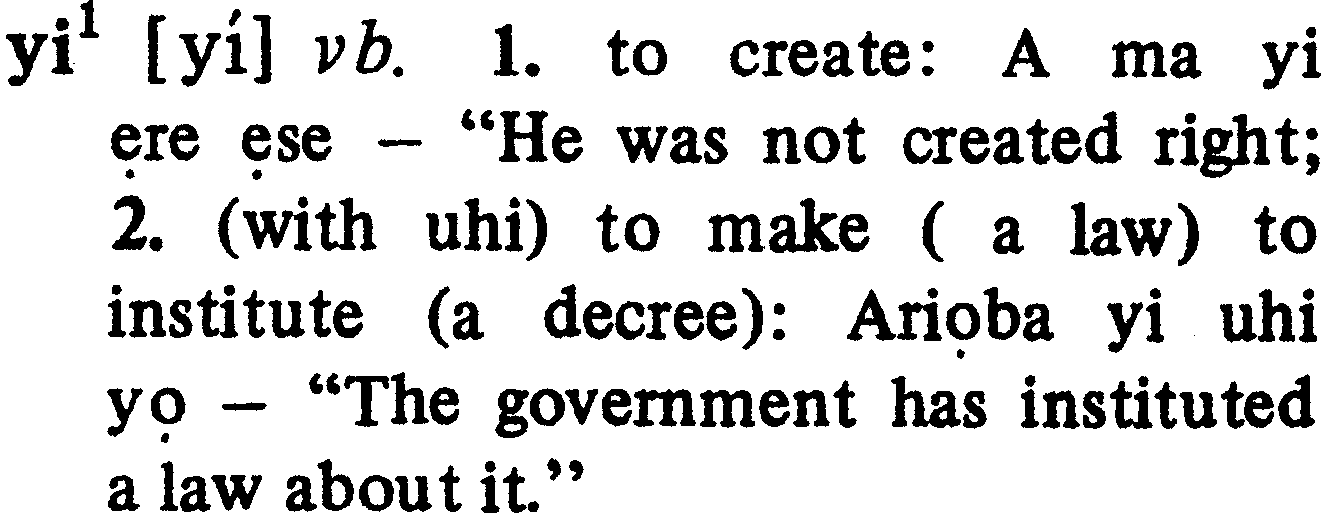
yi2 [yí] prep. cf. ye.

yi3 [yí] adv. expresses the adverbial
meaning of before (in the temporal
sense): Ọ ma ka miọẹ yi ― “He had
never seen it before.” (The clause
usually has the aux ka (previously)
as well).
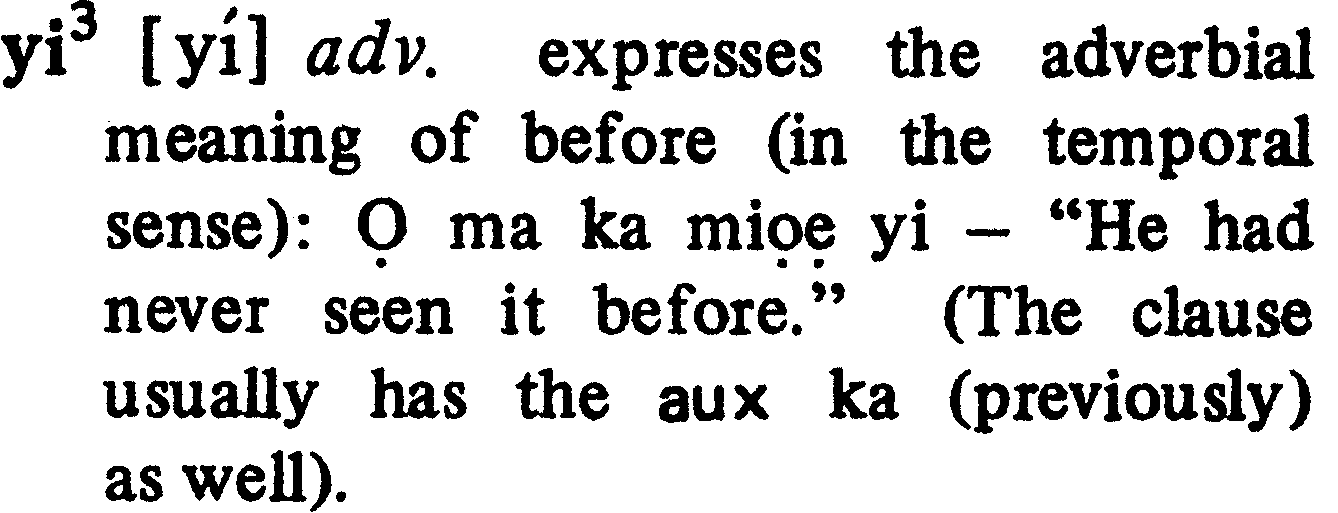
yi4 [yí] vb. (as in yi-ẹro): to take
note of; to be aware of: Ọ yi emwin
$Page 166$

ẹro gbe ― “She is very observant
of things.”

yighẹ [yìɣɛ́] vb. to be weak; to be
frail: Ona yighẹ gbe ― “This is too
weak.”

yiin [ỹĩ̀ĩ́] vb. 1. to behave: Ei yiin
ẹse ― “He does not behave well”;
2. to inhabit; to dwell in: Idunmwun
ọkpa ma kagha yiin ma ke kpaọ
gha di ediran ― “We inhabited the
same street before we left to come
this way”. yiin ke ― “to live next
to; to be neighbours with.”
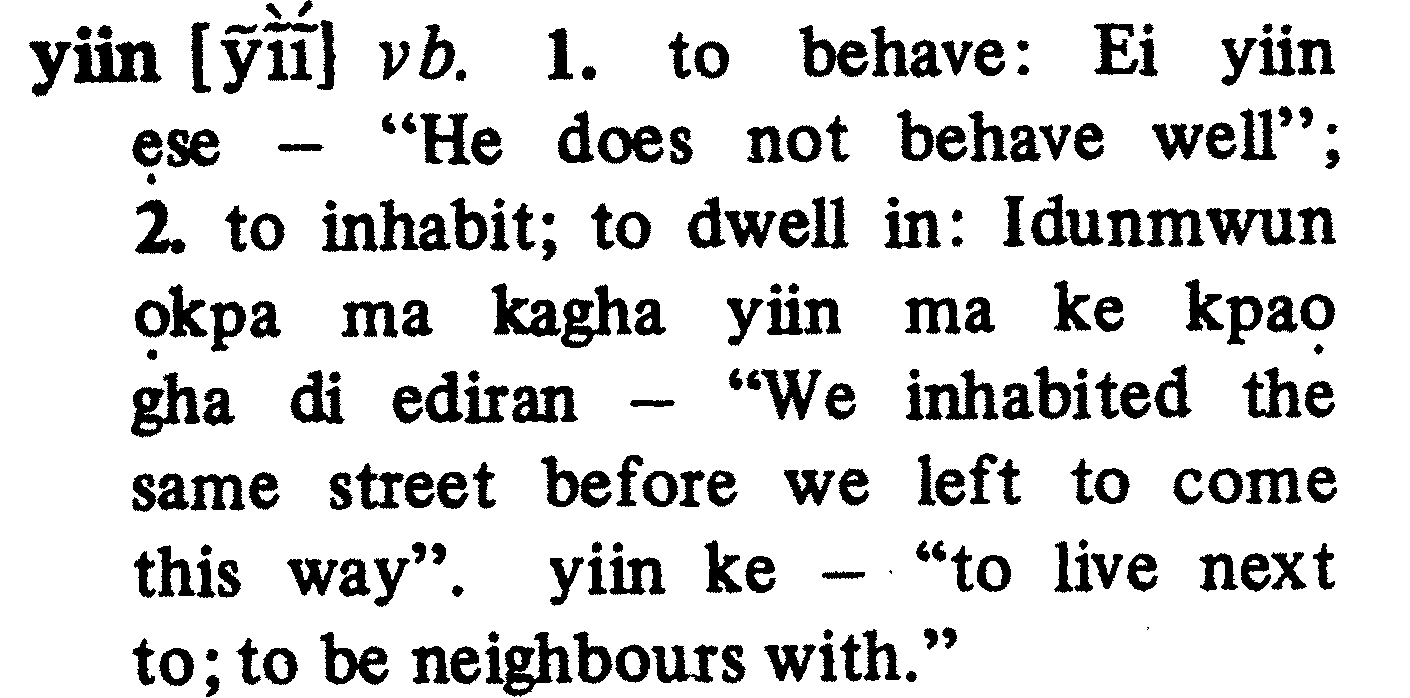
yilo [yìló] vb. 1. (usually of flowing liquid
or drawing substance): to collect
together and drain off; to mop up:
Ọ yilo uwọnmwẹn hin ọkpan rre ―
“She drained off the soup from the
plate.”; 2. (with kua) to drip off;
to slide off.
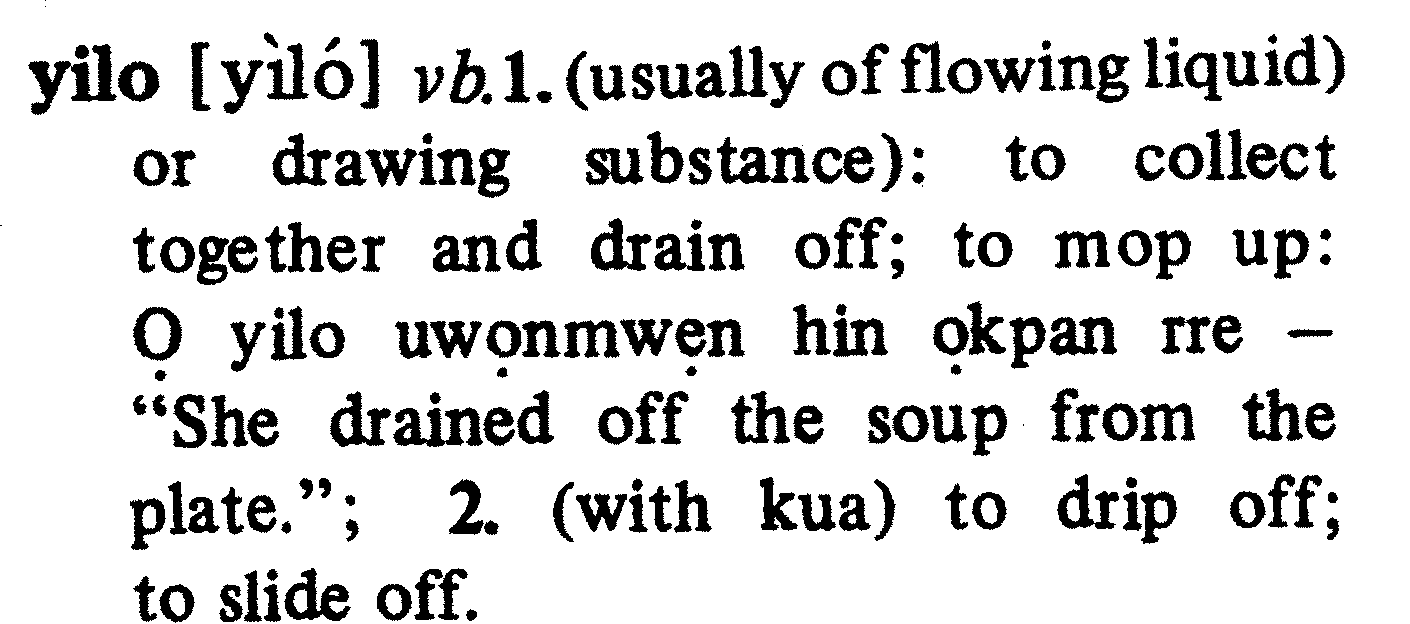
yin1 [ỹĩ́] vb. 1. to be blocked; Ehọ
ọre yiin ― “His ears are blocked:
He cannot hear (well).”; 2. to be dense;
to be tightly packed (e.g. of weed).

yin2 [ỹĩ́] vb. (as in yin-ehiẹn) to pinch.
(with the finger nails).

yo1 [yó] vb. 1. to go; I yo owa ọre
nodẹ ― “I went to his house yester-
day.”; 2. to attend: Ọ yo esọsi ima ―
“He attends our church.” (In the
%%

progressive aspect, rrie is used instead
of yo): Ọ rrie esọsi ― 1. He is going
to the church.

yo2 [yó] vb. 1. to be high (e.g. of a
wall): Ekẹn na yo ― “This wall is
high.”; 2. esteemed; high (e.g. of a
position or post). Ukpo ẹre yo vbe
ehe ne ọ na winna ― “His post is
high or senior in his place of work.”
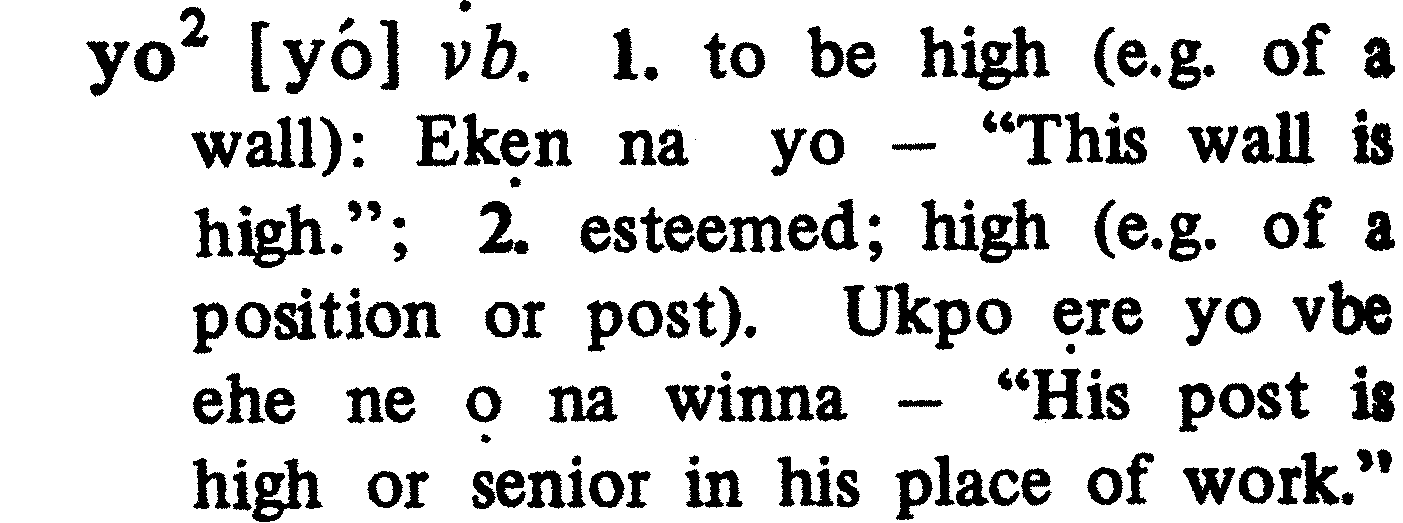
yọ [yɔ́] vb. to wear (a garment): Ọ
yọ ẹwu nọmose ― “She is wearing
a lovely dress.”

yọọ [yɔ̀ɔ́] vb. 1. to arrange one after
the other (usually in a tile or row):
Ọ yọọ iran ye uviẹn ― “He arranged
them in a line.”; 2. (of a crowd):
to move uniformly; to troop: Iran
yọọ dee ― “They are trooping in
this direction.”
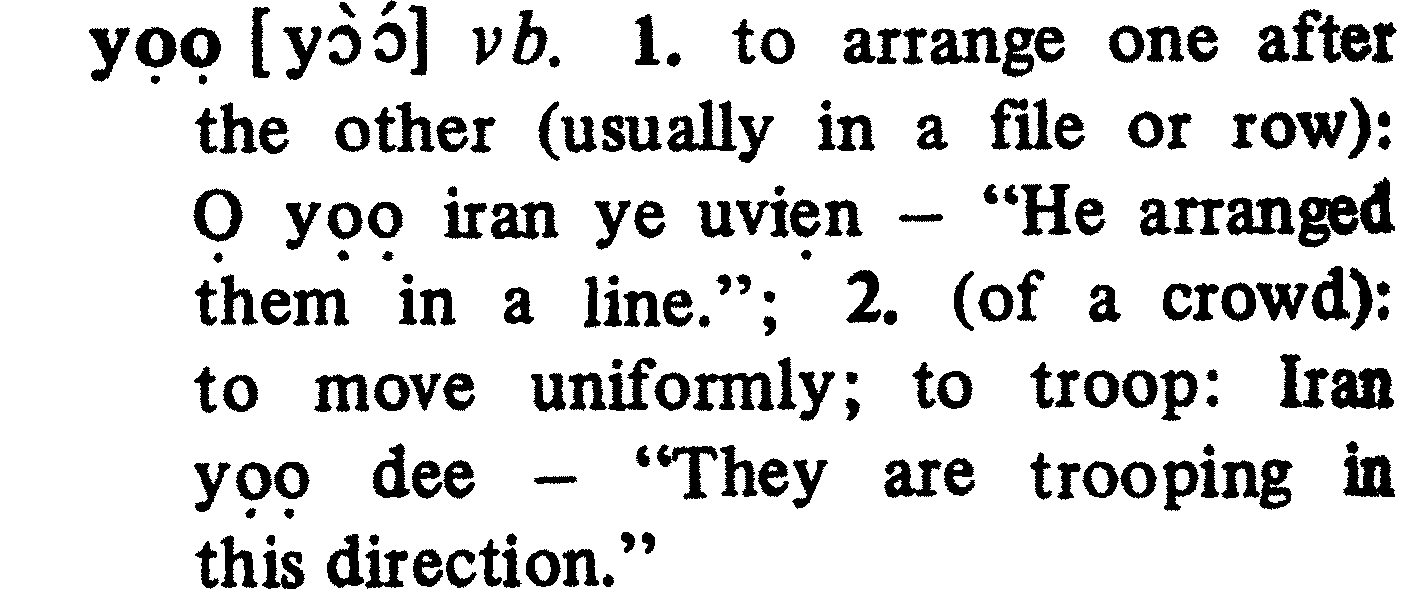
yunmwun [ỹũ̀ɱṹ] vb. 1. to shine (of the
sun): Ovẹn ma yunmwun ẹrẹ ― “The
sun did not shine today.”; 2. (of aro)
to frown; to wear an unhappy or
unpleasant countenance: Ọ yunmwun
aro rua ye uhunmwun ― “He is
wearing a frown.”
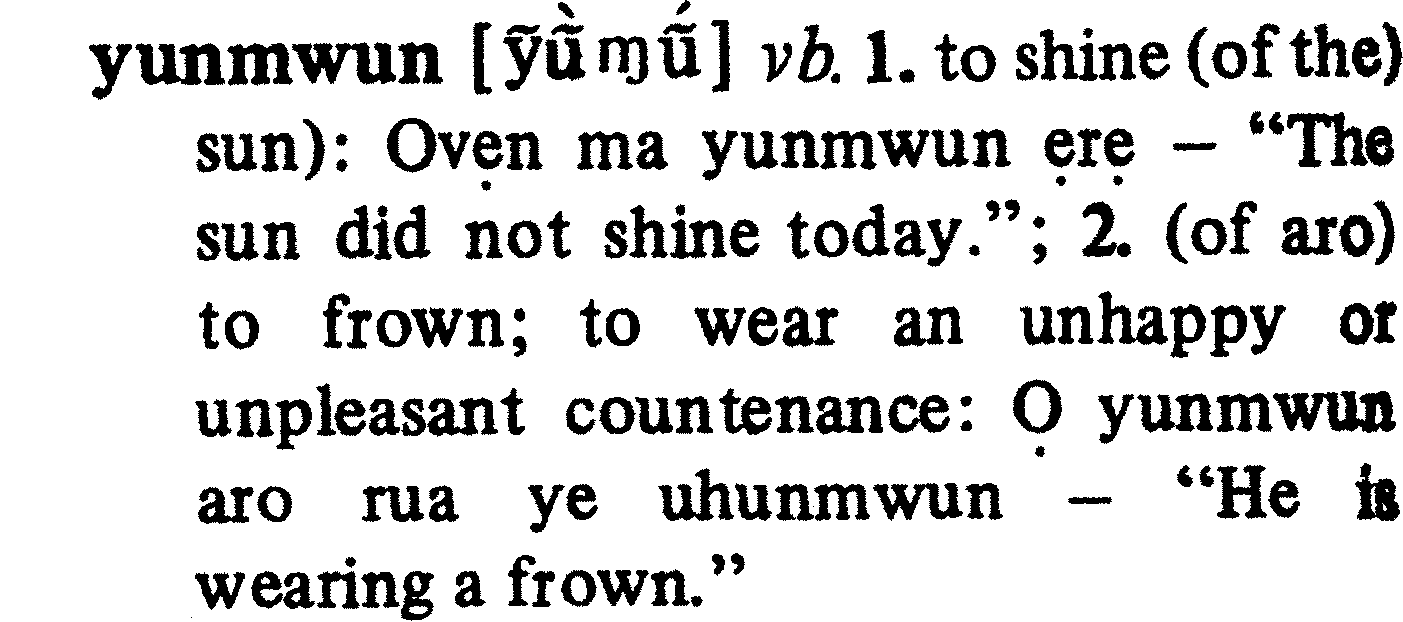
yunnu [ỹũ̀nṹ] vb. (< yan ― unu) “to
open mouth”; to surprise; to amaze:
Ọ yan mwẹn unu ― “It amazed me.”

yuo [yùó] vb. same as wio.
